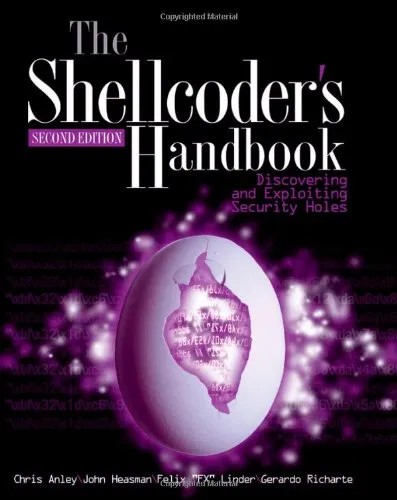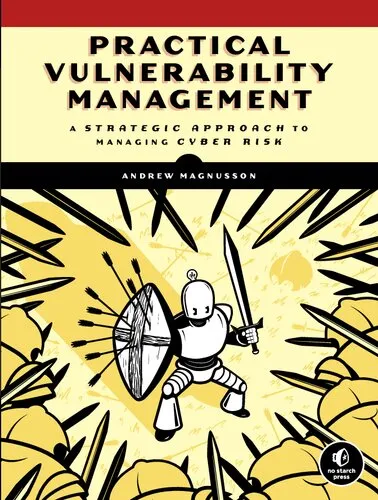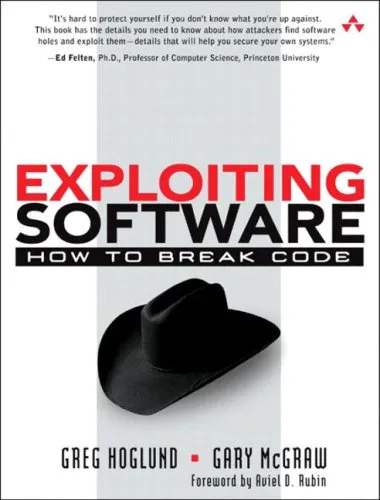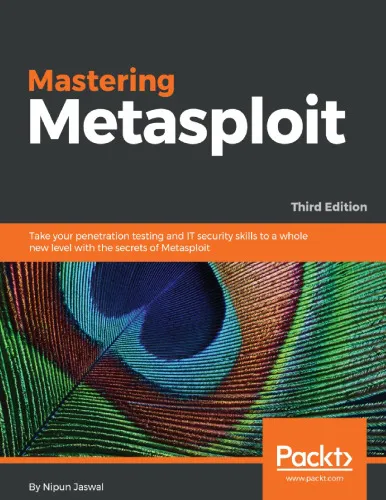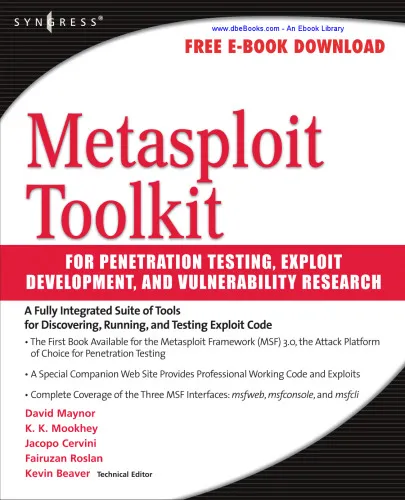The Shellcoder's Handbook: Discovering and Exploiting Security Holes
4.5
بر اساس نظر کاربران

شما میتونید سوالاتتون در باره کتاب رو از هوش مصنوعیش بعد از ورود بپرسید
هر دانلود یا پرسش از هوش مصنوعی 2 امتیاز لازم دارد، برای بدست آوردن امتیاز رایگان، به صفحه ی راهنمای امتیازات سر بزنید و یک سری کار ارزشمند انجام بدینکتاب های مرتبط:
معرفی کتاب 'The Shellcoder's Handbook: Discovering and Exploiting Security Holes'
کتاب 'The Shellcoder's Handbook: Discovering and Exploiting Security Holes' یکی از منابع ارزشمند و جامع در حوزه امنیت سایبری و کشف آسیبپذیریهای امنیتی است. این کتاب که توسط کریس آنلی، جان هیسمان، فلیکس لیندز، و جراردو ریچارت نگاشته شده است، راهنمایی جامع برای متخصصان امنیت و توسعهدهندگان نرمافزار جهت درک عمیق تکنیکهای کشف و سوءاستفاده از آسیبپذیریها ارائه میدهد.
این کتاب به صورت دقیق به موضوعاتی مانند تحلیل حافظه، بهرهگیری از باگهای نرمافزاری، Buffer Overflow ها، بهرهبرداری از آسیبپذیریهای Kernel و حملات شبکه میپردازد. هدف این کتاب کمک به متخصصان امنیت در شناسایی نقاط آسیبپذیر در سیستمها و نرمافزارها و آمادهسازی برای مقابله با حملات است.
خلاصهای از محتوای کتاب
کتاب در چندین فصل اصلی نوشته شده است که هر کدام به عنوان یک ماژول مستقل اطلاعات جامعی را در حوزه امنیت ارائه میدهند. فصلهای اولیه بیشتر به مفاهیم پایه میپردازند، از جمله چگونگی عملکرد حافظه در سیستمعاملها و آنالیز کد برنامهها. فصلهای میانی و پایانی بر موضوعات پیشرفتهتر تمرکز دارند.
- کشف آسیبپذیریهای Buffer Overflow و Stack Overflow
- روشهای نوین در دور زدن مکانیزمهای امنیتی مانند ASLR و DEP
- نحوه تجزیه و تحلیل آسیبپذیریهای Kernel و ساخت Exploit برای آنها
- تکنیکهای پیشرفته Exploitation در سیستمعاملهای مختلف مانند Linux و Windows
- روشهای شناسایی و تحلیل آسیبپذیریهای شبکه
هر فصل شامل مثالهای عملی و تمرینهایی است که خوانندگان را قادر میسازد مفاهیم آموختهشده را به صورت عملی اجرا کنند. از Exploit های ساده گرفته تا حملات پیچیدهتر، تمامی موارد با جزئیات کافی توضیح داده شدهاند.
نکات کلیدی کتاب
- درک عمیق از نحوه عملکرد سیستمعاملها و نرمافزارها
- یادگیری روشهای debugging و تحلیل binary
- آشنایی با تکنیکهای مدرن Exploitation
- پاسخ به سوالهای عملی در حوزه امنیت نرمافزار و سیستمعامل
- ابزارهایی مانند GDB، IDA Pro و ابزارهای دیگر برای تحلیل آسیبپذیریها
این کتاب نه تنها برای کسانی که علاقهمند به حوزه امنیت سایبری هستند، بلکه برای توسعهدهندگانی که میخواهند کدهای امنتری بنویسند، منبعی ارزشمند است.
جملات معروف از کتاب
"Every software system has bugs; our purpose is to find them before someone else does."
"The art of exploitation is not just about writing exploits; it’s about understanding the system meticulously."
"Security is not a product but a process—a never-ending race to protect systems against new threats."
چرا این کتاب مهم است؟
در دنیای امروز که تهدیدات سایبری به شدت در حال افزایش هستند، نیاز به متخصصانی که توانایی شناسایی و از بین بردن ضعفهای امنیتی را داشته باشند، بیشتر از همیشه حس میشود. کتاب 'The Shellcoder's Handbook' به عنوان یکی از منابع اصلی در این زمینه، فرصت یادگیری مهارتهای لازم برای مقابله با تهدیدات امنیتی پیچیده را برای خوانندگان فراهم میکند.
این کتاب به دلیل پوشش کامل موضوعات، جزئیات فنی دقیق، و مثالهای عملی، یکی از بهترین منابع آموزش استفاده اخلاقی از Exploitation و افزایش امنیت سیستمها محسوب میشود. همچنین برای کسانی که تازه وارد حوزه امنیت سایبری میشوند، به مثابه پلی میان دانش پایه و تکنیکهای پیشرفته عمل میکند.
Introduction to 'The Shellcoder's Handbook: Discovering and Exploiting Security Holes'
‘The Shellcoder's Handbook: Discovering and Exploiting Security Holes’ is a definitive guide to the art and science of crafting exploits and uncovering vulnerabilities in software systems. Authored by Chris Anley, John Heasman, Felix Lindner, and Gerardo Richarte, this book provides an unparalleled deep dive into the techniques and methodologies used by security practitioners to identify, understand, and weaponize programming flaws.
With its pragmatic approach and broad coverage of topics ranging from basic programming errors to sophisticated attack vectors, the book caters to both beginners looking to understand the fundamental concepts of shellcoding and seasoned professionals seeking to refine their skills. It challenges readers to think like an attacker while offering valuable insights into writing secure code to defend against these very threats.
Detailed Summary of the Book
The book is structured into chapters that address various aspects of vulnerability discovery and exploit development. It begins by introducing technical concepts, such as stack overflows, heap management, and the inner workings of modern operating systems, ensuring that readers grasp the underlying principles of exploit development. Progressing methodically, the authors guide readers through the intricacies of writing shellcode, a critical component of constructing functional exploits.
One of the book's key strengths is its explanation of platform-specific techniques, with in-depth discussions covering Windows, Unix, Linux, and embedded systems. These platforms are broken down across various architectures, including x86, x64, ARM, and others, ensuring comprehensive coverage for professionals tackling diverse technological environments. Furthermore, the authors address modern countermeasures like DEP, ASLR, and stack canaries, providing techniques to bypass them effectively.
Delving into advanced concepts, the book explores fuzzing for automation of vulnerability discovery, reverse engineering to understand binary structures, and even the ethical implications of exploit development. Along the way, readers are equipped with practical tips, real-world examples, and code snippets that illustrate the principles covered in each chapter.
Key Takeaways
- Understanding the principles and techniques of exploit development from the ground up.
- Mastering the art of shellcode creation tailored to various platforms and architectures.
- Learning how modern defensive measures like DEP, ASLR, and stack canaries work and how attackers bypass them.
- Gaining insights into automated vulnerability discovery processes using fuzzing.
- Building an ethical perspective on the responsibilities of exploit developers and security professionals.
Famous Quotes from the Book
"A good shellcoder is not someone who memorizes recipes. A good shellcoder is someone who understands recipes, takes them apart, and builds them better."
"To discover security holes, you must think like an attacker. In fact, you must think like a very clever and persistent attacker."
"What makes exploit development an art is not the bug; it's the skill and creativity involved in turning a crash into a controllable situation."
Why This Book Matters
‘The Shellcoder's Handbook’ holds a pivotal place in the information security world, owing to its comprehensive approach to one of the most technically challenging domains: exploit development. Unlike many books that merely scratch the surface, this book empowers its readers with the knowledge needed to understand not only how exploits work but why they work. In doing so, it has become a go-to resource for penetration testers, security researchers, software developers, and even academics seeking a deeper understanding of computer security.
What truly sets this book apart is the balance it strikes between theory and hands-on practice. By providing just enough theoretical grounding alongside real-world examples, it equips security professionals to stay ahead of adversaries by understanding how attackers exploit vulnerabilities. Additionally, the book emphasizes ethical behavior and responsible disclosure, reinforcing the importance of using technical skills constructively.
Ultimately, ‘The Shellcoder's Handbook’ continues to resonate with readers because of its timeless content, even in an era of rapidly evolving technology. Its focus on the core principles of secure programming, coupled with actionable techniques for finding and fixing vulnerabilities, makes it an essential addition to every technical bookshelf.
دانلود رایگان مستقیم
شما میتونید سوالاتتون در باره کتاب رو از هوش مصنوعیش بعد از ورود بپرسید
دسترسی به کتابها از طریق پلتفرمهای قانونی و کتابخانههای عمومی نه تنها از حقوق نویسندگان و ناشران حمایت میکند، بلکه به پایداری فرهنگ کتابخوانی نیز کمک میرساند. پیش از دانلود، لحظهای به بررسی این گزینهها فکر کنید.
این کتاب رو در پلتفرم های دیگه ببینید
WorldCat به شما کمک میکنه تا کتاب ها رو در کتابخانه های سراسر دنیا پیدا کنید
امتیازها، نظرات تخصصی و صحبت ها درباره کتاب را در Goodreads ببینید
کتابهای کمیاب یا دست دوم را در AbeBooks پیدا کنید و بخرید
1443
بازدید4.5
امتیاز0
نظر98%
رضایتنظرات:
4.5
بر اساس 0 نظر کاربران
Questions & Answers
Ask questions about this book or help others by answering
No questions yet. Be the first to ask!
